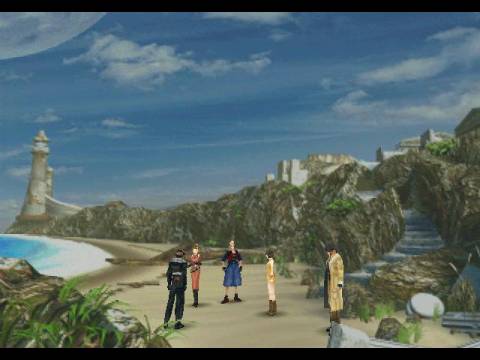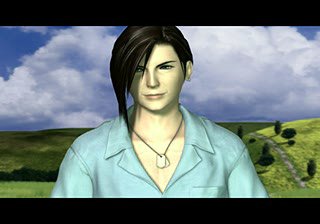Amnesia and Broken Homes: Main Characters in Final Fantasy 8-10
By thatpinguino 28 Comments
Howdy GB people, this begins a series of blog posts that I plan to do on the topic of amnesia and broken homes in the final fantasy series. I am planning on splitting this into three parts: one for FFVIII, one for FFIX and one for FFX. This post will cover FFVIII (yay chronological order). When I'm done I'll combine the three posts into one gigantopost so that it will be possible to read the whole thing at onc, if you are so inclined.
WARNING! SPOILERS FOR ALL OF FFVIII. If you haven't played it then go join the hit sensation that is sweeping the nation: FFVIII.
-----------------------------------------------------------------------------------------------------------------------------------------------------------
Amnesia is a gameplay trope with which I am sure we are all familiar; it is a condition which seems to prey largely upon RPG protagonists and supporting characters, only to be cured in dramatic fashion at the game’s climax. The team at Extra Credits has done an excellent job explaining why this story telling cliché seems to infest game narratives like termites in a condemned house. They explain that amnesia allows game writers to tell a story in medias res, meaning that the game’s story begins in the second act of a three act story arch. The first act of the story is then told later on when the main character’s memory is restored or their past is retold. Thus, the trope of amnesia allows the writers to skip straight to the action and backload the backstory. Though Extra Credits’ explanation gives a broad overview of why games would choose to employ the amnesia trope on a mechanical level (skip the explaining, get to the action), it does not cover how amnesia shapes the types of narratives we see in games. That is where I hope to add to the discussion, in this post I will show how amnesia and imperfect memory play a central role in the narratives of Final Fantasy 8-10. Specifically, I will show how each game uses amnesia and imperfect memory to reframe its narrative in the third act, transforming each narrative from a hero’s triumph over evil to a son’s struggle to accept and reconnect with his father. In creating three main characters with absentee fathers, each game is able to drastically alter the interpretive context of their main narrative by introducing each character to their father during the final act. By analyzing these three games together I will show how each game is able to take a bombastic, world-spanning adventure and convert that bombast into a deeply personal tale of self-discovery and family history.

Final Fantasy VIII’s story is especially interesting in that 4 of the game’s 6 playable characters suffer from some degree of amnesia and 5 of them are orphans. Every SeeD (young mercenaries in the FFVIII world) in the game suffers from long term amnesia (this horrible epidemic is explained by the game as a side-effect of Guardian Forces, FFVIII’s summoned monsters) and the Garden (a sort of military school) serves as a refuge for orphans. But, regardless of the game’s hokey explanation for its cast’s forgetfulness and the seeming ubiquity of broken homes, it is Squall’s fragmented past that the game focuses on. Squall’s orphan past is slowly revealed to the player over the course of the game in the form of flashbacks and dialog with his fellow orphans. Though Squall’s past is partially explained and explored, it often seems secondary to the more pressing current events that the game presents. Squall’s role as a SeeD in the battle against the sorceress, as well as his budding relationship with Rinoa, seem to be the driving narrative forces in the game, and they are in some ways; however, the developers also carefully seeded a parallel narrative in the game in the form of Laguna’s story. For much of the game, this side-story appears to be just that: a side-story; yet, as Laguna’s story progresses it becomes clear that Laguna is more than a bit player in FFVIII. Before the game’s finale Squall's parantage is revealed by Laguna and his friends Kiros and Ward. Kiros tells Squall, “you look very much like your mother,” Ward tells him, “good thing you don’t look like your father,” and Laguna tells him, “let’s talk when this is all done. I have a lot to tell you;” thus, Laguna is strongly implied to be Squall’s father. With this one revelation Squall’s entire story is rewritten. Squall’s relationship with Rinoa changes from a slowly growing teenage romance to the culmination of a generation of unfulfilled love, as Squall is Laguna’s son and Rinoa is the daughter of Julia, Laguna’s first love. Squall’s battle against the sorceress is also inherited as he is the son of the man who defeated Sorceress Adel, the last sorceress threat. Even Squall’s reluctant and improbable leadership is inherited: while his father was a bit of a buffoon who was pressed to lead due to his charisma, Squall was called to lead the Garden due to his intelligence and sense of duty, despite the fact that he is a very insular person. Squall’s story in FFVIII is in fact a journey towards realizing and understanding his father’s role in shaping his position in the world; rather than a pure story of adventure and young love.

At first glance, it appears as if Squall has inherited his father’s romantic relationship, leadership role, and destiny without inheriting any of the personality and charisma that made Laguna the man he is. Yet, it is interesting that Squall begins to grow beyond his isolated and insular self as he unknowingly follows his father’s lead. It is his relationship with Rinoa, his battle with Edea, and his command of the Garden that cause him to value the lives and company of others. By following directly in his father’s footsteps, Squall is able to grow from a petulant child into a caring and well-adjusted human being. At the game’s conclusion we are able to see that, while Squall first followed his father’s destiny, he then grows to surpass his father. Laguna acknowledges his son’s growth during Squall’s final mission as a SeeD; Laguna outlines Squall’s mission to stop Ultimecia and charges Squall with saving the world, as Laguna can no longer do so himself. Laguna literally passes control on to the next generation, as Squall and his friends will determine the fate of the world based on the outcome of their fight against Ultimecia. The game’s final cut-scene further emphasizes this changing of the guard as Laguna’s visit to Raine’s grave is juxtaposed with Squall and Rinoa’s first kiss. Laguna’s is left reminiscing of the woman he has lost and of the marriage he unknowingly abandoned while Squall’s relationship is only beginning.
Thus, by keeping Squall’s history and memories shrouded in mystery, the developers were able to completely reframe the way one reads Squall’s story. The narrative is at first one of an introverted jerk growing into a caring lover, yet in the third act it is revealed to be the tale of a young man following in his father’s footsteps, only to surpass him.
